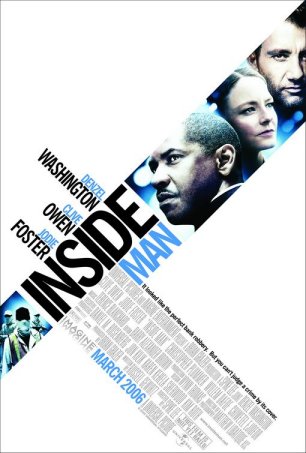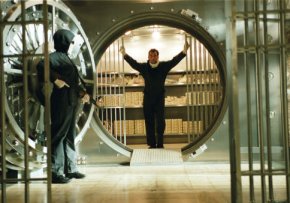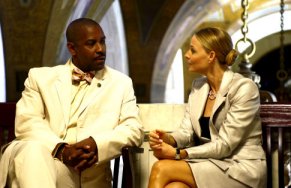|
Inside
Man
Clive Owen answers
the who, what, where, when and why right off the bat. And
why not? In Spike Lee's Inside Man, those questions
don't matter nearly as much as the how, because he's working
from a script that barely has the answers. Yet it
moves so well that we hardly notice.
Working from
a script by Russell Gewirtz, Lee makes his most mainstream
"joint," at a time when his career could use it. It's not
that Lee had lost his touch; it's just that every now and
then this brilliant filmmaker needs to remind everybody
just how good his touch can be. Lee succeeds by lifting
this moderately clever heist film into something far cooler
than it should have been.
The film matches
two masters of bemused iciness against each other. While
Owen plays criminal mastermind Dalton Russell, Denzel Washington
breezes through as the slightly immoral Detective Keith
Frazier. Gewirtz' script offers them a good game of cat
and mouse, with the balance tilting back and forth as they
size each other up.
From the outset,
partly from Dalton's opening monologue, we know that he
succeeded in his bank heist. Lee cuts in a few shots to
illustrate Dalton's points, then shows us the crime unfold
like clockwork.
To make us work
at the title, the Director also flashes forward to Frazier
and his partner Mitchell (Chiwetel Ejiofor) interviewing
the hostages after the fact, trying to determine just who
and who was not in on the heist. Those scenes get shot with
a bright washed-out look, possibly on hi-def, that lend
them both an immediacy and the sense of drudgery that interrogations
must be.
But Inside
Man isn't just a caper film. It does a great job of
getting us inside the mess of police work, capturing casual
tensions, ugliness and decency. A few ethnic tensions flare
up, dealt with in a realistic manner but not made to be
the focus. Though admittedly an extraordinary one, this
is still just another day in the life of New York's Finest.
Purposely, the
hostages don't get quite so much focus. If they did, we
might know much sooner who besides Clive Owen's Russell
really exists under the masks. Lee does give us a couple
of line-ups, but with so many hostages in the bank, it's
hard to remember them. Clever, since Russell tells us in
the first minute to pay close attention.
The film also
has a cynical undertone, as something rotten lies at the
core of the bank. Christopher Plummer plays the bank's founder,
troubled by some secret hidden in a safe deposit box. To
make sure that secret does not get spilled in the chaos,
he hires Madeleine White (Jodie Foster), a discreet power
broker, to negotiate with the masked bandits.
This secret
makes the film's real macguffin, an excuse to let Foster
appear as someone whose morality has all the consistency
of Play-Doh. She plays it cold, a good contrast to the delicate
warmth of Plummer. Both characters embody a casual corruption
that can still be used to serve society, a cynical statement
that feels like one of the reasons Spike Lee took this job.
Yet that statement
also fuels several plot holes and a dangling thread or two.
The energy of the direction allows us to overlook the fact
that characters figure out clues that actually, only the
audience saw. Even the revelation of the "inside man" makes
little sense, though it has a dramatic purpose.
We're not meant
to think too hard on this one, just ride it as the actors
do. Everyone seems to be at the top of their game, refusing
to sleepwalk when they easily could have. (I'm going to
have to learn to spell Chiwetel Ejiofor's name from memory,
because this guy is rapidly climbing to stardom.) Lee mixes
in established names with vaguely familiar faces, without
really having a weak link. Inside
Man is definitely more mainstream than most of Spike
Lee's work, and if it means that he can afford to make a
couple of personal films for every one of these, audiences
should welcome him back to this genre whenever he wants. Rating: 
|








